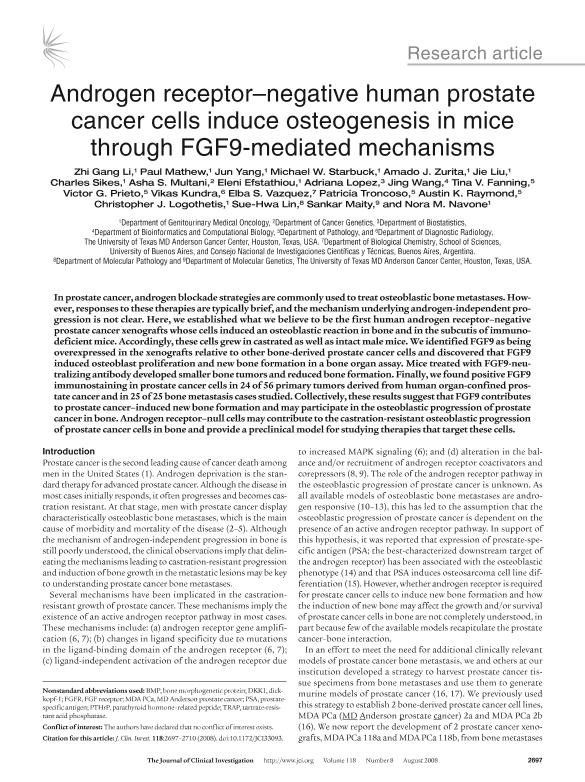Artículo
Androgen receptor-negative human prostate cancer cells induce osteogenesis in mice through FGF9-mediated mechanisms
Zhi, Gang Li; Mathew, Paul; Yang, Jun; Starbuck, Michael W.; Zurita, Amado J.; Liu, Jie; Sikes, Charles; Multani, Asha S.; Efstathiou, Eleni; Lopez, Adriana; Wang, Jing; Fanning, Tina V.; Prieto, Victor G.; Kundra, Vikas; Vazquez, Elba Susana ; Troncoso, Patricia; Raymond, Austin K.; Logothetis, Christopher J.; Lin, Sue-Hwa; Maity, Sankar; Navone, Nora M.
; Troncoso, Patricia; Raymond, Austin K.; Logothetis, Christopher J.; Lin, Sue-Hwa; Maity, Sankar; Navone, Nora M.
 ; Troncoso, Patricia; Raymond, Austin K.; Logothetis, Christopher J.; Lin, Sue-Hwa; Maity, Sankar; Navone, Nora M.
; Troncoso, Patricia; Raymond, Austin K.; Logothetis, Christopher J.; Lin, Sue-Hwa; Maity, Sankar; Navone, Nora M.
Fecha de publicación:
08/2008
Editorial:
American Society for Clinical Investigation
Revista:
Journal of Clinical Investigation
ISSN:
0021-9738
Idioma:
Inglés
Tipo de recurso:
Artículo publicado
Clasificación temática:
Resumen
In prostate cancer, androgen blockade strategies are commonly used to treat osteoblastic bone metastases. However, responses to these therapies are typically brief, and the mechanism underlying androgen-independent progression is not clear. Here, we established what we believe to be the first human androgen receptor-negative prostate cancer xenografts whose cells induced an osteoblastic reaction in bone and in the subcutis of immunodeficient mice. Accordingly, these cells grew in castrated as well as intact male mice. We identified FGF9 as being overexpressed in the xenografts relative to other bone-derived prostate cancer cells and discovered that FGF9 induced osteoblast proliferation and new bone formation in a bone organ assay. Mice treated with FGF9-neutralizing antibody developed smaller bone tumors and reduced bone formation. Finally, we found positive FGF9 immunostaining in prostate cancer cells in 24 of 56 primary tumors derived from human organ-confined prostate cancer and in 25 of 25 bone metastasis cases studied. Collectively, these results suggest that FGF9 contributes to prostate cancer-induced new bone formation and may participate in the osteoblastic progression of prostate cancer in bone. Androgen receptor-null cells may contribute to the castration-resistant osteoblastic progression of prostate cancer cells in bone and provide a preclinical model for studying therapies that target these cells.
Palabras clave:
Prostate Cancer
,
Fgf 9
,
Castration Resistant
,
Osteoblastic Bone Metastasis
Archivos asociados
Licencia
Identificadores
Colecciones
Articulos(IQUIBICEN)
Articulos de INSTITUTO DE QUIMICA BIOLOGICA DE LA FACULTAD DE CS. EXACTAS Y NATURALES
Articulos de INSTITUTO DE QUIMICA BIOLOGICA DE LA FACULTAD DE CS. EXACTAS Y NATURALES
Citación
Zhi, Gang Li; Mathew, Paul; Yang, Jun; Starbuck, Michael W.; Zurita, Amado J.; et al.; Androgen receptor-negative human prostate cancer cells induce osteogenesis in mice through FGF9-mediated mechanisms; American Society for Clinical Investigation; Journal of Clinical Investigation; 118; 8; 8-2008; 2697-2710
Compartir
Altmétricas



